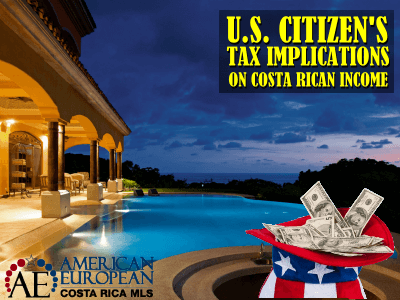Estimated Reading Time: 6 Minutes
What are the tax implications for U.S. citizens working or having a business in Costa Rica? And their spouses’?
Costa Rica is regarded as one of the safest bets in the emerging markets thanks to its strong exports, high tourism levels, and high levels of Foreign Direct Investment.
If you are a U.S. citizen planning to work or do business in Costa Rica, here are a few implications you need to know about.
1. Costa Rica Tax System
Costa Rica has progressive income tax rates, ranging from 0%-30%, and are of 2 types: income tax on wages and income tax on profit-generating activities.
Income Tax for Wages (Fixed Salary) 2020
Taxable Monthly Income Tax Rate
1. CRC 0 – 840,000 no tax
2. CRC 840,000 – 1,233,000 10%
3. CRC 1,233,000 – 2,163,000 15%
4. CRC 2,163,000 – 4,325,000 20%
5. Over CRC 4,325,000 25%
Income Tax for Businesses 2020
Taxable Monthly Income Tax Rate
1. CRC 0 – 54,303,000 10%
2. CRC 54,303,000 – 109,228,000 20%
3. Over CRC 109,228,000 30%

2. Double Taxation
An American living abroad or a Green Card holder must file a US federal tax return using a hard copy of filing taxes online. To avoid double taxation, check the foreign earned income exclusion (FEIE). Under the 2019 FEIE, U.S. expats can exclude an income of $107,600 for 2020 earned abroad from their US tax obligation.
3. Tax Implications of Foreign Spouses
Whether to claim a non-citizen spouse on your tax return depends on your spouse’s residency status. Is your spouse a resident alien or a non-resident alien?
If your non-citizen spouse qualifies for either of these tests, he/she can be a resident alien:
- Green Test: If your non-citizen spouse has a green card (the federal government’s authorization to live and work in the United States permanently).
- Substantial Presence Test: If your non-citizen spouse was in the United States for a minimum of 31 days of the year and a minimum of 183 days over three years, including the current year and the two years immediately before that.
If your spouse doesn’t have a green card or resident alien status, he/she doesn’t qualify as a resident alien and is considered a non-resident alien (NRA).
2 Choices
If this is the case, you have 2 choices:
1. Treat your spouse as a resident alien for tax purposes.
If you choose to follow this route, you need to report your spouse’s worldwide income, and it will be subjected to U.S. tax.
2. Treat the spouse as a non-resident alien for tax purposes.
If you want to follow this route, you don’t have to include your NRA spouse’s income on your U.S. tax return. While filing your U.S. income tax, you need to use the filing status of “married, separate”. However, if your NRA spouse has no income sources within the U.S. and is not dependent on another U.S. taxpayer, you can claim an exemption for your spouse. But, ensure that you obtain an Individual Taxpayer Identification Number for your spouse before filing the return.

4. Vacation Rental Property
Having vacation rental investment property in Costa Rica also has tax implications. If you have a rental property that operates at a loss, you still need to report. You’ll need to report all foreign rental income.
However, there are a few exceptions. Suppose you are using a foreign property for rental income. In that case, you can deduct the following on your U.S. tax return: mortgage interest, property taxes, travel expenses, and other operating costs required to maintain your foreign rental property.
On your Costa Rican tax return, you will only be able to deduct maintenance expenses and property tax, but not the mortgage interest.
5. Using IRA or 401(k) to buy Property
You can use your IRA to purchase a property in Costa Rica, which also has tax implications. You’ll first have to purchase through a custodian to establish a self-directed IRA.
Even if your IRA owns the property, you have to pay income tax in Costa Rica on the rental income, as well as capital gain tax when you sell the property.
A self-directed IRA gives you the freedom to choose the investment of your funds, but you will still need a custodian to invest on your behalf. Another option is to set up a checkbook IRA. For this, you must create an account with a self-directed IRA custodian that allows non-traditional investments.
Although 401(k) doesn’t allow you to invest directly in real estate, you can borrow against it and use it to make a down payment toward your property. Another method of buying a property in Costa Rica is to roll over your 401(k) into a self-directed IRA and then use the proceeds to invest in real estate.
Before using your retirement plan to buy an investment property in Costa Rica, you should first talk to your IRA custodian as well as your tax advisor.
The Author
 Rick Pendykoski owns Self Directed Retirement Plans LLC, a retirement planning firm based in Goodyear, AZ. He has over three decades of experience working with investments and retirement planning, and over the last 10 years has turned his focus to self-directed accounts and alternative investments. Rick regularly posts helpful tips and articles on his blog at SD Retirement as well as Business.com, SAP, MoneyForLunch, Biggerpocket, SocialMediaToday, and NuWireInvestor. If you need help and guidance with traditional or alternative investments, email him at rick@sdretirementplans.com.
Rick Pendykoski owns Self Directed Retirement Plans LLC, a retirement planning firm based in Goodyear, AZ. He has over three decades of experience working with investments and retirement planning, and over the last 10 years has turned his focus to self-directed accounts and alternative investments. Rick regularly posts helpful tips and articles on his blog at SD Retirement as well as Business.com, SAP, MoneyForLunch, Biggerpocket, SocialMediaToday, and NuWireInvestor. If you need help and guidance with traditional or alternative investments, email him at rick@sdretirementplans.com.



















